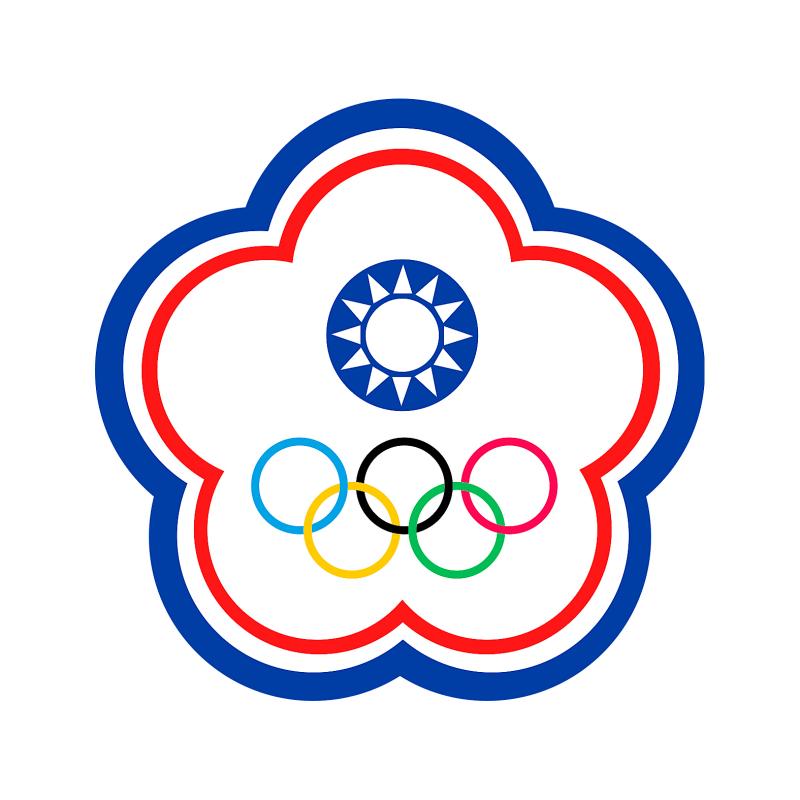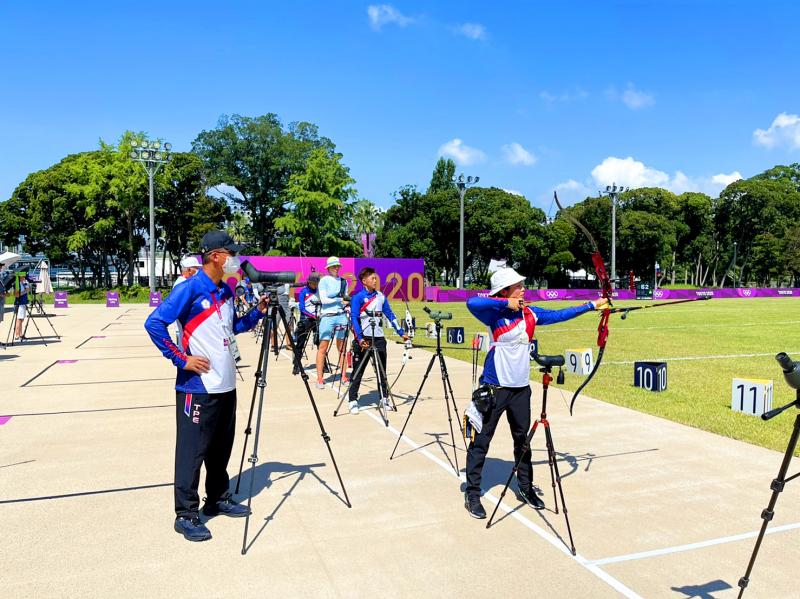Lawmakers yesterday questioned ties between members of the Chinese Taipei Olympic Committee (CTOC) and the Chinese Nationalist Party (KMT), calling for “transitional justice” after a controversy over airplane seating for Taiwan’s Olympic athletes.
As the Olympic delegation left for Japan on Monday, badminton player Tai Tzu-ying (戴資穎) wrote on Instagram that she missed the roominess of the seating in EVA Airways’ business class, which drew apologies from President Tsai Ing-wen (蔡英文), Premier Su Tseng-chang (蘇貞昌) and other officials, as Tsai in 2016 had pledged that all athletes and their coaches would fly in business class to international competitions.
Democratic Progressive Party (DPP) Legislator Huang Kuo-shu (黃國書) yesterday said that in Taiwan, as in most countries, non-governmental organizations run the national Olympic committee so that politics do not interfere.

Screen grab from the committee’s Web site.
The DPP administration does not make decisions for the Olympic delegation, Huang said.
The Sports Administration gives the CTOC the funds for the Olympics, but the administration has no say in the committee’s decisions, otherwise it would not be in compliance with the International Olympic Committee’s charter — most Taiwanese do not understand this, he added.
While Olympic athletes being seated in economy class sparked a public furor, pan-blue politicians placed the blame on the president and the DPP government, saying that they had betrayed the athletes’ trust and deceived the public.

Photo courtesy of Ni Tai-chih
On Wednesday, Taiwan Statebuilding Party Legislator Chen Po-wei (陳柏惟) said that the CTOC and most sports governing bodies in Taiwan are either controlled by KMT members, affiliated with them, or controlled by businesspeople with close KMT ties.
CTOC president Lin Hong-dow (林鴻道) is the second-generation owner of property-development conglomerate Hung Kuo Corp (宏國建設) and his mother, Lin Hsieh Han-chien (林謝罕見), was a high-ranking KMT official, Chen said.
CTOC vice president Chen Shyh-kwei (陳士魁) was Executive Yuan secretary-general under former president Ma Ying-jeou (馬英九), while CTOC top adviser Sun Lih-chyun (孫立群) was Executive Yuan spokesman under Ma, Chen added.
Sports in Taiwan need transitional justice, Chen said.
“Changes must be made to allow new members and the younger generation into these sports bodies,” Chen said.
KMT-affiliated officials take up the top posts, not because of their sports expertise or experience in sports business, but because of their loyalty to the KMT during the party’s authoritarian regime, he said.
DPP Legislator Rosalia Wu (吳思瑤) said that many athletes and citizens are demanding that the CTOC and Taiwan’s other sports governing bodies have greater transparency and better accountability, including calls for another round of sports reform, following amendments to the National Sports Act (國民體育法) in 2017.
The Sports Administration allocated NT$150 million (US$5.35 million) to the CTOC, which decided on how to spend the money without lawmakers or the public, Wu said.
“These entrenched problems keep recurring, especially with the CTOC, where Olympic athletes get angered and complain to the public,” Huang said. “So it is once again time to push for reform at the CTOC and other sports governing bodies, to make changes and make them more accountable and transparent.”

A preclearance service to facilitate entry for people traveling to select airports in Japan would be available from Thursday next week to Feb. 25 at Taiwan Taoyuan International Airport, Taoyuan International Airport Corp (TIAC) said on Tuesday. The service was first made available to Taiwanese travelers throughout the winter vacation of 2024 and during the Lunar New Year holiday. In addition to flights to the Japanese cities of Hakodate, Asahikawa, Akita, Sendai, Niigata, Okayama, Takamatsu, Kumamoto and Kagoshima, the service would be available to travelers to Kobe and Oita. The service can be accessed by passengers of 15 flight routes operated by

GIVE AND TAKE: Blood demand continues to rise each year, while fewer young donors are available due to the nation’s falling birthrate, a doctor said Blood donors can redeem points earned from donations to obtain limited edition Formosan black bear travel mugs, the Kaohsiung Blood Center said yesterday, as it announced a goal of stocking 20,000 units of blood prior to the Lunar New Year. The last month of the lunar year is National Blood Donation Month, when local centers seek to stockpile blood for use during the Lunar New Year holiday. The blood demand in southern Taiwan — including Tainan and Kaohsiung, as well as Chiayi, Pingtung, Penghu and Taitung counties — is about 2,000 units per day, the center said. The donation campaign aims to boost

ENHANCING EFFICIENCY: The apron can accommodate 16 airplanes overnight at Taoyuan airport while work on the third runway continues, the transport minister said A new temporary overnight parking apron at Taiwan Taoyuan International Airport is to start operating on Friday next week to boost operational efficiency while the third runway is being constructed, the Ministry of Transportation and Communications said yesterday. The apron — one of the crucial projects in the construction of the third runway — can accommodate 16 aircraft overnight at the nation’s largest international airport, Minister of Transportation and Communications Chen Shih-kai (陳世凱) told reporters while inspecting the new facility yesterday morning. Aside from providing the airport operator with greater flexibility in aircraft parking during the third runway construction,

American climber Alex Honnold is to attempt a free climb of Taipei 101 today at 9am, with traffic closures around the skyscraper. To accommodate the climb attempt and filming, the Taipei Department of Transportation said traffic controls would be enforced around the Taipei 101 area. If weather conditions delay the climb, the restrictions would be pushed back to tomorrow. Traffic controls would be in place today from 7am to 11am around the Taipei 101 area, the department said. Songzhi Road would be fully closed in both directions between Songlian Road and Xinyi Road Sec 5, it said, adding that bidirectional traffic controls would